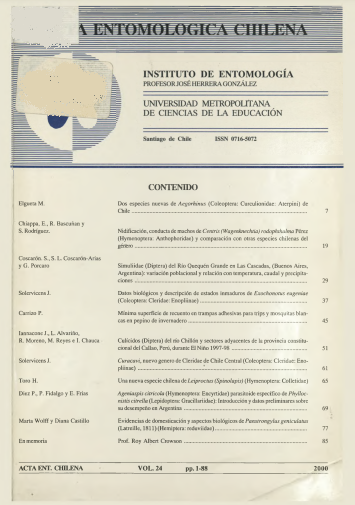Contenido principal del artículo
jul 7, 2022
Resumen
Panstrongylus geniculalus is considered a sylvatic triatomine and has been found naturally infected
with Trypanosoma cruzi in human habitations in the municipality of Amalfi, Antioquia-Colombia. Evidence
of P. geniculatus domestication is reported here. 640 houses were sampled monthly during a year in nine
towns, at Amalfi, Antioquia. 93 adults, eggs and a nymph were collected in 80 houses.
The indicators of risk of transmission of T. cruzi by P. geniculatus found were: dispersión (100%),
domiciliary infeslation (12,5%), density (14,53%), colonization (1,25%), accumulation (116,25%) and
relative infection (21,21%). In two towns: Montebello and Picardía, was observed P. geniculatus parasitized
by T. cruzi, with indexes of 21,21% and 50% respectively. In laboratory the consumption of blood and the
time of feeding were bigger in females of P. geniculatus than in males and the times of deyection was
smaller in females than males. The displacement of this insect toward the housings was not determined
exclusively by electric light, since 24% of housings lack it; probably ecological changes and housings
conditions can favor the lodging of this triatomine.


